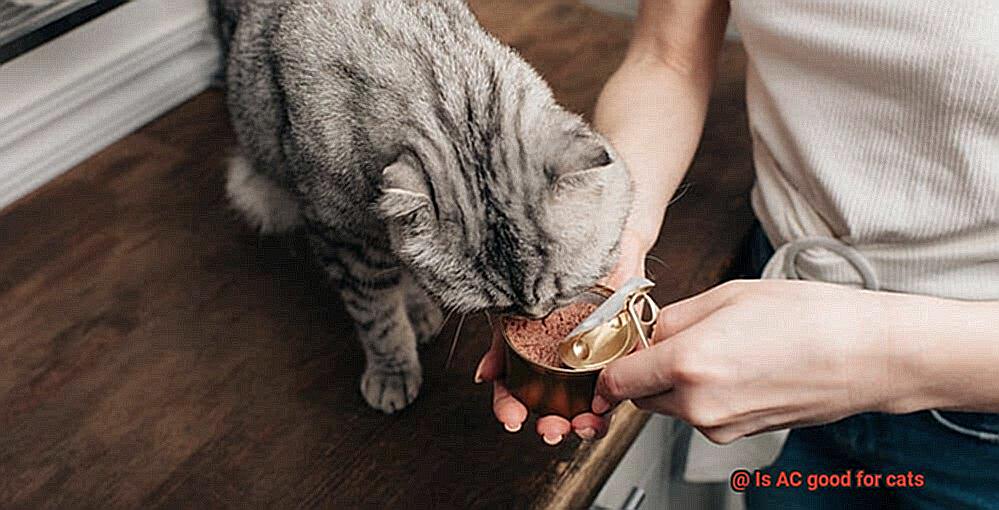Picture this: you walk through the door after a grueling day at work, and all you want to do is collapse into your air-conditioned haven. But as you make your way to the couch, you notice your cat panting and looking visibly uncomfortable. So, is AC good for cats?
It’s a question that plagues many pet owners, and for good reason. While air conditioning can provide much-needed relief from sweltering temperatures, it’s important to understand how it affects our feline friends. The truth is that AC can be both beneficial and harmful to cats, depending on several factors.
In this blog post, we’ll delve into everything you need to know about how AC impacts cats. We’ll explore their temperature preferences and susceptibility to heat stroke, as well as how to adjust your AC settings to keep them comfortable. We’ll also examine some of the potential negative effects of AC on cats’ respiratory health, skin moisture levels, and behavior.
But don’t worry – we won’t leave you hanging with all the bad news. We’ll wrap up with practical tips for making your home more cat-friendly while still enjoying the benefits of air conditioning. So grab a cozy spot with your furry friend by your side and let’s dive into the question: Is AC good for cats?

Potential Risks Associated with Air Conditioning and Cats
While air conditioning can be a lifesaver during hot summer months, it’s essential to understand the potential risks associated with air conditioning and cats.
One of the primary concerns with air conditioning and cats is respiratory problems. Cats are vulnerable to respiratory issues, and air conditioning units can circulate dust, allergens, and mold spores throughout the home, which can irritate their respiratory system. This can cause coughing, wheezing, or even bronchitis.
Another threat is dehydration. The dry air caused by air conditioning can lead to dehydration in cats, resulting in urinary tract infections, kidney problems, and other health issues.
Cats may also experience skin and eye irritation due to the dryness caused by air conditioning. This can cause itching, scratching, and even skin infections. Cold air from air conditioning can also result in eye irritation in cats, leading to watery or red eyes.

Additionally, air conditioning units produce loud noises that may frighten or stress cats. This can lead to behavioral problems such as aggression or anxiety.
Despite these potential risks, there are many benefits to using air conditioning for cats. Cats are sensitive to heat and can become overheated quickly, especially during the summer months. Overheating can lead to dehydration, lethargy, and even heat stroke. Air conditioning can regulate a cat’s body temperature and prevent these issues.
To mitigate these risks, ensure proper ventilation and maintain a comfortable temperature that isn’t too cold or dry for your feline friend. Monitor your cat’s behavior and health when using air conditioning and consult with your veterinarian if you have any concerns.
Benefits of Using Air Conditioning for Cats
While air conditioning may not be the first thing that comes to mind when it comes to cat care, it can actually be a lifesaver during hot summer months. There are numerous benefits of using air conditioning for cats that every cat owner should know.
First and foremost, air conditioning provides a comfortable living environment for your furry friend. Just like humans, cats also feel uncomfortable in hot and humid weather. If your cat is finding it difficult to breathe or move around due to the heat, air conditioning can provide them with a cool and refreshing space to relax.
Heat exhaustion can be fatal for cats, especially if they have pre-existing medical conditions. This is where air conditioning can play a vital role in keeping your cat healthy. By preventing heat-related illnesses such as dehydration, skin and eye irritation, and even bronchitis or kidney problems, air conditioning ensures that your cat stays healthy.
Apart from promoting good health, air conditioning can also help your cat sleep better. If your cat is struggling to sleep due to the heat, air conditioning can provide a cool and comfortable environment that promotes better sleep. And we all know how important sleep is for our feline friends.
Furthermore, cats are susceptible to dehydration in hot weather, especially if they are not drinking enough water. Air conditioning can help reduce the risk of dehydration by providing a cool and refreshing environment that encourages your cat to drink more water.

Last but not least, air conditioning helps reduce the risk of heatstroke. Heatstroke is a severe condition that can be fatal for cats. By maintaining a cool and comfortable environment inside your home, air conditioning can help prevent this life-threatening condition.
How to Minimize Risk When Using Air Conditioning
As the summer heat rolls in, air conditioning becomes a necessity for many households. However, as a cat owner, it’s important to be aware of the potential risks that come with using air conditioning. Luckily, there are steps you can take to minimize these risks and ensure your feline friend stays healthy and comfortable.

Prevent Dehydration

One of the most significant risks of air conditioning is dehydration. Cats lose moisture more quickly in cold, dry environments, so it’s crucial to provide them with access to fresh water at all times. You can also use a humidifier in the room where your cat spends the most time to help combat the dry air.
Avoid Exposure to Cold Air
Cats are more sensitive to temperature changes than humans, so it’s vital to set the AC at a comfortable level for them. Avoid setting the temperature too low and provide your cat with a warm place to curl up if they start to feel chilly. This could be a cozy bed or blanket near a sunny window.
Clean and Maintain Your AC Unit
The buildup of dust, mold, and other particles in your AC unit can cause respiratory issues for cats. Regularly clean and maintain your unit by changing the air filters and cleaning the unit itself. You could also consider having a professional inspect and clean your unit annually.
Use an Air Purifier
An air purifier can be used in conjunction with your AC unit to help filter out allergens and pollutants in the air. This is especially helpful if you or your cat have allergies or asthma.
Monitor Your Cat’s Health
Keep an eye on your cat’s behavior and health when using air conditioning. If you notice any signs of respiratory issues or dehydration, consult with your veterinarian promptly. Signs of dehydration may include lethargy, dry mouth, or sunken eyes, while respiratory issues may manifest as coughing, sneezing, or wheezing.
The Role of Humidity in Regulating Temperature

It’s true. High humidity can make cats feel uneasy and lethargic, while low humidity can lead to dry skin, nasal passages, and eyes.
Fortunately, there are several steps you can take to ensure your cat’s environment has a comfortable humidity level. For starters, air conditioning can help regulate humidity levels in your home. However, it’s important to maintain and clean your air conditioning unit regularly to prevent the growth of mold and bacteria that could harm your cat’s respiratory system.
Providing access to fresh water and a humidifier can also go a long way in regulating humidity levels. Additionally, proper ventilation in your home can help keep the air fresh and circulating.
Tips for Keeping Your Cat Comfortable in Hot Weather
As temperatures soar, it’s crucial to keep your feline friend comfortable and cool. Cats are more susceptible to heatstroke, and high humidity can make it even harder for them to regulate their body temperature. So, how can you help your cat stay comfortable during hot weather? Here are five tips:
Hydration is key
Make sure that your cat always has access to plenty of fresh, clean water. You could consider placing additional water bowls around the house and adding ice cubes to their water bowl. This will help keep the water cooler for longer, encouraging your cat to drink more frequently.
Keep them in the shade
Just like humans, cats need a place to escape from the sun’s rays. If your cat spends time outdoors, provide them with access to shaded areas where they can rest and cool down.
Use fans
Fans can be an excellent way to circulate air and keep your cat cool. Be sure to place a fan in the room where your cat spends most of their time, but avoid blowing it directly at them as this could cause discomfort.
Groom regularly
Regular grooming helps remove dead hair and keeps your cat’s coat clean, which helps them regulate their body temperature better.
Playtime matters
Exercise is essential for your cat’s physical and mental well-being, but avoid playing with them during the hottest part of the day. Instead, try playing with them early in the morning or late in the evening when it’s cooler outside.
Additionally, air conditioning can be an effective way to keep your cat comfortable during hot weather. However, make sure that the temperature is not too low, and provide a warm spot for your cat to curl up in if they feel too cold.
Common Signs of Overheating in Cats
One of the most common issues that cats face during hot weather is overheating, which can lead to serious complications such as heat stroke or dehydration. To prevent such situations, it’s important to be aware of the common signs of overheating in cats.
One sign to look out for is excessive panting. Unlike dogs, cats don’t normally pant, so if you notice your cat doing so, this could be a surefire sign that they are struggling to regulate their body temperature. Another common sign of overheating in cats is drooling. If you notice your cat drooling more than usual, it’s time to act.
Lethargy is another symptom of overheating in cats. When cats overheat, they tend to feel tired and sluggish. So if you notice that your cat is less active than usual or seems exhausted, they may be too hot.
Vomiting is yet another sign of overheating in cats. Overheating can cause cats to become ill and start vomiting. If your cat starts throwing up and seems unwell, seeking veterinary care right away is imperative.
Restlessness and discomfort are additional symptoms of overheating in cats. Your furry friend may seem agitated and continuously search for cooler areas in your home. It’s important to act quickly if you notice any of these symptoms.
If you suspect your cat is overheating, move them to a cooler area of your home immediately. Offer them cool water to drink or wrap them in a damp towel to help reduce their body temperature.
Remember that overheating can lead to severe complications like heatstroke and dehydration. If you notice any of these symptoms, seek veterinary care right away. Your vet may recommend additional measures such as IV fluids or medications to help bring down your cat’s body temperature and prevent further damage.
YLLeb4xwV7k” >
Conclusion
In conclusion, the question of whether air conditioning is beneficial for cats is not a straightforward one. While it can provide relief from scorching temperatures and prevent heat-related illnesses like dehydration and heat stroke, it also poses potential risks to cats’ respiratory health, skin moisture levels, and behavior. Therefore, it’s crucial to understand your cat’s temperature preferences and susceptibility to heat stroke and adjust your AC settings accordingly.
To minimize the risks associated with using air conditioning, proper ventilation, regular cleaning and maintenance of the AC unit, use of air purifiers, and monitoring your cat’s behavior and health are essential steps. However, despite these potential risks, there are numerous benefits to using air conditioning for cats.
It provides a comfortable living environment for them by promoting good health through preventing heat-related illnesses. Additionally, it helps them sleep better while encouraging hydration and reducing the risk of heatstroke.
To keep your feline friend comfortable during hot weather months, ensure they have access to plenty of fresh water and shaded areas outdoors. You could also use fans to circulate air indoors but avoid blowing directly at them. Regular grooming is also important in helping them regulate their body temperature better.
Lastly, be aware of common signs of overheating in cats such as excessive panting or drooling. Seek veterinary care immediately if you notice any symptoms.







